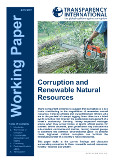Resource information
There is important evidence to suggest that corruption is a key factor contributing to the degradation of renewable natural resources. Forestry officials and law enforcement officers who are in the pockets of corrupt logging firms often turn a blind eye to activities that threaten the sustainable management of a forest’s biodiversity. Similarly, fishery inspectors endanger stocks when they accept bribes to ignore official quotas for trawlers. Within countries, poor governance may translate into sub-standard environmental policies, leaving interest groups to determine the common ‘environmental good’. In extreme cases, high-level political corruption can facilitate the wholesale plunder of a country’s natural resources. This paper looks at the current findings and discourse surrounding corruption in three renewable natural resources: forestry, fisheries and wildlife.



